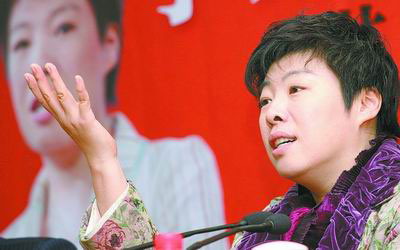|
曾几何时,北师大教授于丹被冠上了“学术超女”的“美”名?或许,她自己并不想如此。自《<论语>心得》上市以来,于丹遭遇了两个极端,很多读者对她无比推崇,但也有不少人从未停止对她的批评和抵制。有人说她掀起了一波传统文化回归的热潮,有人抨击她传播错误思想,纯为炒作。孰是孰非,还是读过她的书、了解庄孔之道的人心里最有谱。据报道,于丹新书《<庄子>心得》异常火爆,其人气大有盖过《<论语>心得》之势。
|
|
 |
| Yu Dan, a 41-year-old media scholar at Beijing Normal University, has attracted nationwide attention with her televised lecture series about the Analects of Confucius, written by his disciples around 475 BC. |
For centuries, Chinese women were discouraged from pursuing education so that they could be more "virtuous". Confucius, China's most famous thinker, educator and philosopher, would never have anticipated that 2,500 years later, his thought would be popularized among his Chinese descendants by a woman.
Yu's popularity was visible for all to see at a book signing ceremony in Beijing. To her publisher's delight, the literature master stunned the public by selling more than 600,000 copies of her book about theAnalects.
For over 2000 years, Confucius' doctrine of love, fidelity, politeness and self-discipline has been mainstream thought in the minds of the people of East Asia, including China, Japan and South Korea.
"I am not an expert in Confucian studies," Yu admitted. "I am just willing to share with people my understanding of these centuries-old pearls of wisdom."
Yu grew up in reading Chinese classics including the ancient philosophy of Mencius, Chuang Tzu and Lao Tzu.
In her lectures and book, the short-haired fashionable-looking lady explained the abstruse maxims with lively stories. The deified Confucius was an amiable elderly teacher and his disciples were curious, sometimes cunning, students.
"As I see it, those philosophical, inspiring ideas and arguments about human existence and social life should not be regarded merely as interesting quotes, glistening with wisdom but of little use for day-to-day living. Instead, they are simple truths that can jump the barrier of time and space and shed new light for the future of every human being," she said.
Yu's lessons were treasured by many people.
There are nearly 10,000 posts on the bulletin board named after Yu Dan on theportalBaidu.com. White collar workers, college students, professors, migrant workers, community guards and retired grannies all had something to say.
But not everyone has been won over.
A playwright identified by his pen name as Saiwailiyue said that he found 14 errors in Yu's speech. "The Analects of Confucius record the thought of China's greatest philosopher, but Yu selected only a small part of the book, maybe one tenth, related to living a happy life. This is misleading to readers," he said.
"It is sheerhype," said a netizen named Huang Wenzhi, "what she really cares about is profit, even though she claims she is indifferent to fame and fortune."
Experts speculate that the popularity of Yu's lecture may signal a return by Chinese people to Confucianism, as many people have lost their bearings in China's rapidly developing economy and modernizing society.
Although Yu's lectures embroider their own story from the Analects, she must be credited with transforming the classics from a dusty pile of paper to something relevant to people in an internet era.
"The program caught the interest of audiences and resurrected the glamour of Chinese history and traditional culture," said Yi Zhongtian, Professor of literature and history at Xiamen University in east China's Fujian Province, adding that in-depth study of the works is a job for historians.
But Chen Donghui, associate professor with the Chinese history research center at Zhejiang University warned people that Yu Dan's lessons could never replace the Analects of Confucius. "Yu Dan's lectures are a bit like fast food. If you want to reach the real kernel of Chinese culture and thought, you need to prepare an elaborate banquet," he said.
Even Yu Dan is little worried. "The temperature of the classics should be maintained at the same level as the body heat of human beings. Fever is not healthy."
Yu Dan's new series of lectures about Chuang Tzu screened to an expectant public during the Spring Festival holiday.
(Xinhua)
Vocabulary:
Analects: 文集
portal: 门户网站
hype:炒作
(英语点津陈蓓编辑)